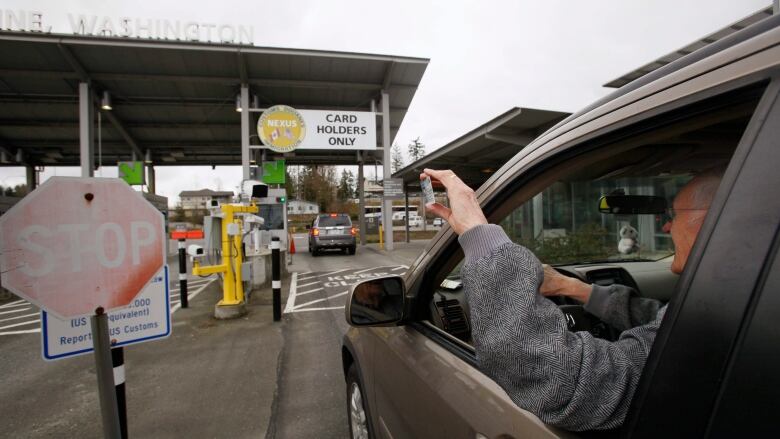Canada hoping U.S. gets on board as it moves to update gender info on NEXUS cards
Draft report suggests departments use 'M,' 'F' and 'X' as identifiers

Canada's border agency is about to shake up the way it tracks sex and gender information which could lead to some awkward conversations with Washington.
For the past two years, the federal government has been looking into how to introduce a third gender identifier across federal departments something beyond checking off "male" or "female" on a form.
The new plan includes displaying gender information (how someone identifies) instead of sex information (biological characteristics) unless absolutely necessary, says an interim report prepared for the clerk of the Privy Council, a copy of which was obtained under access to information.
The draft plan encourages departments to offer M, F and Xas identifiers.
It also says the policy overhaul would affect the NEXUS card, a program shared by the U.S. and Canada to help speed up border crossing for frequent, low-risk travellers.
However, changing the card will require negotiations with the Trump administration, which recently banned most transgender people from serving in its military.
Apart from the NEXUS card, the Canada Border Services Agency also issues ID cards forthe Fast and Secure Trade Program (FAST) and corporate pilots.
CBSA spokesperson Rebecca Purdy said the department can't force another country to follow its rules.
"As each of our domestic and international relationships are different (bilaterally and multilaterally), and we cannot impose our policies upon our partners, the CBSA will work to inform them of this government of Canada policy shift and hopefully reach a satisfactory solution wherever possible that respects Canadian laws and values," she said in an email to CBC.
Frontline training needed
Helen Kennedy is theexecutive director of Egale Canada, a national LGBT advocacy group. She'surging the government to put up a good fight with the Americans.
"I don't think that we can be compromising our human rights, values and principles to accommodate anybody, quite frankly, regardless of who's in the White House. I do know that there are a lot of governments around the world that are hostile, not just the U.S.," she said.
"I would anticipate and hope that Canada would stand its ground and push for a more inclusive way of travelling for anybody who identifies as non-binary or trans, or whose gender expression doesn't match the marker on their passport."
Kennedy said the policy shift needs to come with training for those on the frontlines.
"It is incredibly stressful for trans and non-binary folk, and for people whose gender expression may not reflect the markers on their passports, to travel anywhere. I think that it's a good initiative, but we also need to be aware of some of the complications that it brings with it," she said.
"If we don't provide the education and training to the folks who are reviewing these documents ...if they don't understand, if they don't have the language, if they're not comfortable or familiar with what an X marker can actually mean, then it can be very stressful for the traveller."
The PCO report says a policy update also would bring the federal government in line with provinces that have made changes already. For example, people in Ontario and Alberta can choose an "X" identifier on their drivers' licences.
Kennedy said she'd prefer if there were no gender markers at all, but supports the shift.
Immigration, Refugees and Citizenship Canada (IRCC) already has started down this path.
Gender 'unspecified'
In 2017 it announced plans to offer a third option for Canadians to identify themselves on a passport. In the interim, people can ask that a free observation sticker be added to their passport or travel document that reads: "The sex of the bearer should read as 'X,' indicating that it is unspecified."
IRCC said it doesn't know how many Canadian travellers have beenrefused entry to foreign countries because of their gender identity.
"Before booking, travellers are advised to check with all the countries they are planning to visit or transit through so they can be aware of entry requirements that may affect them," said a spokesperson in an email.
The PCO report said implementationof the new gender identifier policy could take years and would have significant financial and operational impacts.
It's not clear when federal forms will be changed officially, but former clerk of the Privy Council Michael Wernick, whose last day on the jobwas Wednesday, has said he's in favour of the current policy direction.
"Given domestic and international movement on this issue, it is clear that the government of Canada must be engaged and must coordinate action to respond at the federal level," he wrote in a letter to the Treasury Board, also obtained by CBC.
The federal policy change also would affect military IDs, permanent resident and Indian Status cards, work permits, firearm licences and police record check letters.












_(720p).jpg)


 OFFICIAL HD MUSIC VIDEO.jpg)
.jpg)



























































































